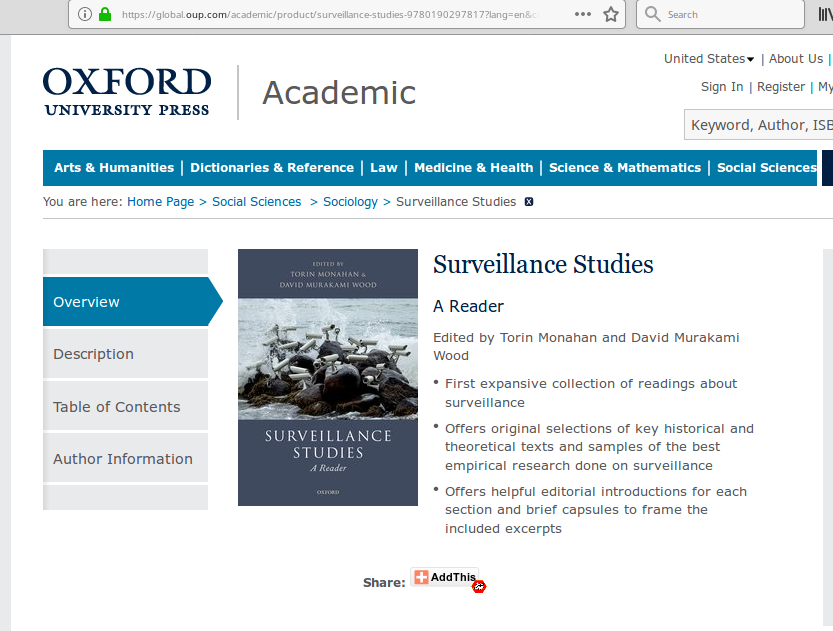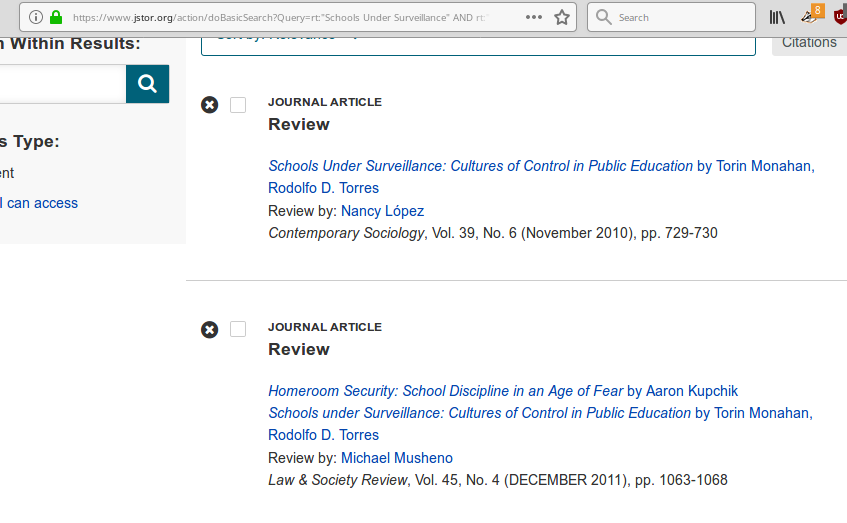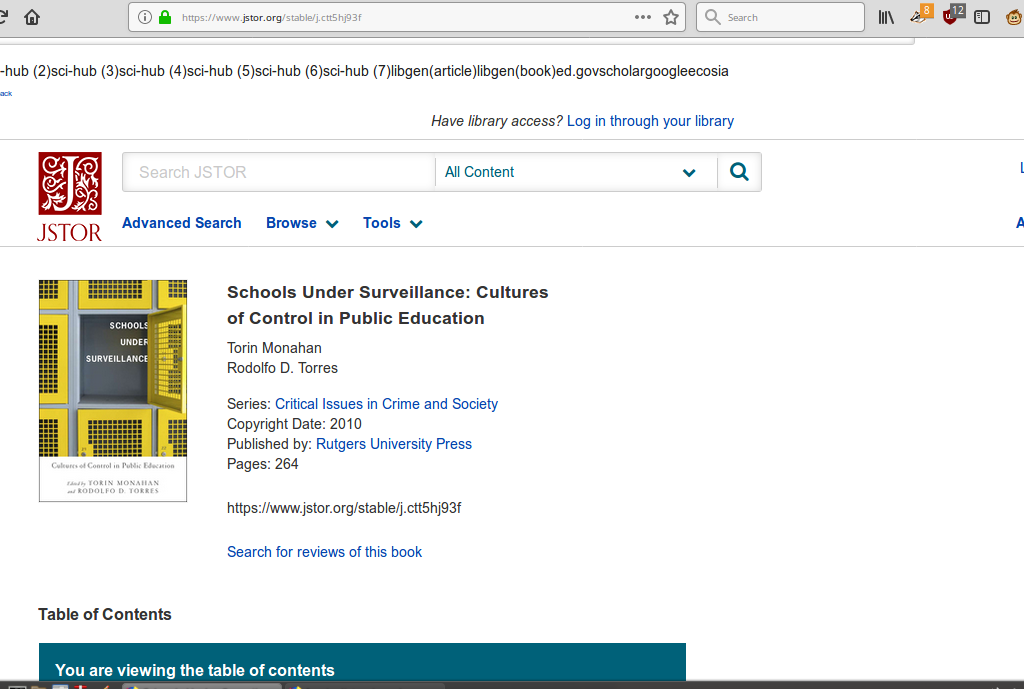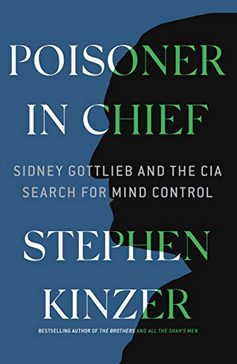https://www.theatlantic.com/international/archive/2019/11/lingering-trauma-east-german-police-state/601669/Thirty years after reunification, memories of the East German police state continue to exact a profound psychological toll.

Moderators: Elvis, DrVolin, Jeff
https://www.theatlantic.com/international/archive/2019/11/lingering-trauma-east-german-police-state/601669/Thirty years after reunification, memories of the East German police state continue to exact a profound psychological toll.
Schools under Surveillance gathers together some of the very best researchers studying surveillance and discipline in contemporary public schools. Surveillance is not simply about monitoring or tracking individuals and their data--it is about the structuring of power relations through human, technical, or hybrid control mechanisms. Essays cover a broad range of topics including police and military recruiters on campus, testing and accountability regimes such as No Child Left Behind, and efforts by students and teachers to circumvent the most egregious forms of surveillance in public education. Each contributor is committed to the continued critique of the disparity and inequality in the use of surveillance to target and sort students along lines of race, class, and gender.


 [/url]
[/url]
Front Matter
Front Matter
(pp. i-iv)
Cite this Item
Table of Contents
Table of Contents
(pp. v-viii)
Cite this Item
Introduction
Introduction
(pp. 1-18)
Torin Monahan and Rodolfo D. Torres
The imperative to protect children is seldom questioned. It would seem degenerate to do so. But one must wonder what it means when armed police officers roam school hallways, when students line up for more than an hour before class just to get past security screening checkpoints, when fingerprinting is required for students to enter schools or use school cafeterias, or when schools look more like prisons, with barbed-wire perimeters, video surveillance, and police cars parked on campus. Sometimes public schools are even located in former prisons.¹
Public education is one important domain where the perceived need for greater security...
Cite this Item
Part I New Disciplinary Orders:: Police, Surveillance, and Inequality in the Carceral School
Chapter 1 To Protect, Serve, and Mentor? Police Officers in Public Schools
Chapter 1 To Protect, Serve, and Mentor? Police Officers in Public Schools
(pp. 21-37)
Aaron Kupchik and Nicole L. Bracy
A recent report published by the New York Civil Liberties Union (Mukherjee 2007) describes the growth in numbers of police officers and school safety agents (who are under the control of the New York City Police Department) in New York City public schools, and abuses of students and school staff at the hands of these officers. The report is disturbing—the abuses described include physical abuse and sexual harassment of students, retaliatory arrests of school staff who protect students from abuse at the hands of police, and other offenses. After illustrating the litany of problems associated with police in schools,...
Cite this Item
Chapter 2 School Surveillance in America: Disparate and Unequal
Chapter 2 School Surveillance in America: Disparate and Unequal
(pp. 38-54)
Paul Hirschfield
The importation of surveillance tactics from criminal justice and the military into schools is most commonly attributed to elevated fears of school violence and a growing realization that “itcanhappen here.” Interestingly, however, the rural and suburban schools where the most extreme forms of violencedidhappen tend to avoid the relatively invasive surveillance and control methods (such as metal detectors and personal searches) that have become commonplace in the largest and poorest urban school districts (Hirschfield 2008). For example, in late summer of 1999 when the Littleton, Colorado, community was mourning the April in-school massacre of thirteen of...
Cite this Item
Chapter 3 The Docile Body in School Space
Chapter 3 The Docile Body in School Space
(pp. 55-70)
Lizbet Simmons
InDiscipline and Punish: The Birth of the Prison(1979), Michel Foucault establishes the particularities of modern power and the practice of punishment by tracing their institutionalization in the prison system. With the prison as his ultimate example, Foucault argues that modern power is embedded and advanced in the disciplines, a set of practices that organizes individuals and the spaces they occupy for the production of docile bodies. The disciplines work to manipulate individuals by the technologies of modern power, which proceed, remarkably, without force. Foucault suggests that this shift toward a more subtle authority happened at the end of...
Cite this Item
Part II Schools as Markets:: Selling Security, Buying Students
Chapter 4 Safety or Social Control? The Security Fortification of Schools in a Capitalist Society
Chapter 4 Safety or Social Control? The Security Fortification of Schools in a Capitalist Society
(pp. 73-86)
Ronnie Casella
Imagine you are a young person entering a school. This may be the series of events that unfolds: even before entering, you may be recorded by surveillance cameras that have the ability to zoom in and archive the footage that is taken; you may be required to scan an ID card that retrieves information about you and is able to track your whereabouts through a radio-frequency identification (RFID) system; you may pass through an upright metal detector; or have your body scanned, perhaps your face, iris, or palm, by a device that checks your biometric reading against a database of...
Cite this Item
Chapter 5 Online Surveillance in Canadian Schools
Chapter 5 Online Surveillance in Canadian Schools
(pp. 87-103)
Valerie Steeves
Fifteen years ago, I met a music teacher who was about to receive an award for his innovative use of “new technologies” in the classroom. The teacher was being recognized for using video recording equipment to provide his music students with feedback on performances. He prefaced the discussion of his work by saying that of course the best thing about the technology was that he could leave it on all the time. Although the students were unaware of the fact, he used the cameras to take attendance and to monitor them when he was out of the classroom so he...
Cite this Item
Chapter 6 “School Ownership Is the Goal”: Military Recruiting, Public Schools, and Fronts of War
Chapter 6 “School Ownership Is the Goal”: Military Recruiting, Public Schools, and Fronts of War
(pp. 104-120)
Tyler Wall
The active search for civilian bodies, especially youthful bodies, to transform them into military bodies is a relentless military venture. Finding bodies for war is one aspect of a larger process of societal militarization, which can be understood as “the contradictory and tense social process in which civil society organizes itself for the production of violence” (Geyer quoted in Sherry 1995, xi). Hence, militarization can be a logistical process in that it makes mass organized violence possible while blurring civilian and military spheres by aligning other institutions with military goals (Lutz 2002a). Militarization is also a cultural process that structures...
Cite this Item
Part III Security Cultures:: Preparing for the Worst
Chapter 7 Reading, Writing, and Readiness
Chapter 7 Reading, Writing, and Readiness
(pp. 123-139)
Richard A. Matthew
In 1999, the Department of Justice issued a report entitledThe Appropriate and Effective Use of Security Technologies in U.S. Schools. The author of the report, Mary Green, identifies a large number of threats that “can be reduced with appropriate surveillance technology such as cameras, sensors, [and] microdots” (Green 1999, 21). Even schools that have not yet experienced violence, thefts, and other problems should consider increased surveillance—and other measures. “Many school buildings in the United States,” the author notes, “have been constructed to achieve an inviting and open-to-the-community feeling, with multiple buildings, big windows, multiple entrances and exits, and...
Cite this Item
Chapter 8 Risky Youth and the Psychology of Surveillance: The Crisis of the School Shooter
Chapter 8 Risky Youth and the Psychology of Surveillance: The Crisis of the School Shooter
(pp. 140-156)
Tyson Lewis
Drawing on the work of sociologist Ulrich Beck, Nanette Davis has argued that “surplus-risk” has come to define American adolescents (1999, xiii). Surplus risk is an excessive form of risk above and beyond the normal trials and tribulations that define adolescence. Davis’s list of social risks include the uncertainty of an unstable economy, the inability of schools and social institutions to provide individuals with the information and skills needed to make rational choices, the replacement of community bonds with market logics and consumerist identities, and the growing inability to assess benefits from social participation beyond self-interest. For youth, these risks...
Cite this Item
Part IV Accountability Regimes:: Tests, Standards, and Audits as Surveillance
Chapter 9 “Politics by Other Means”: Education Accountability and the Surveillance State
Chapter 9 “Politics by Other Means”: Education Accountability and the Surveillance State
(pp. 159-174)
Pauline Lipman
Stuart Hall famously noted that “Education might be thought of as the pursuit of politics ‘by other means’[;] … it is not therefore by chance or in error that every major change in the education structure needs to be understood as being intimately connected to a shift in power” (quoted in Grace 1984, 37). In this chapter, I address the questions, in what sense is education, as Hall suggests, “politics by other means” in the post–9/11 context, and what is at stake? To appreciate what is at stake, I begin by situating education policies within the present social conjuncture:...
Cite this Item
Chapter 10 The Measure of Success: Education, Markets, and an Audit Culture
Chapter 10 The Measure of Success: Education, Markets, and an Audit Culture
(pp. 175-193)
Michael W. Apple
In a number of volumes over the past decade, I have critically analyzed the processes of “conservative modernization”—the complicated alliance behind the wave after wave of educational reforms that have centered around neoliberal commitments to the market and a supposedly weak state, neoconservative emphases on stronger control over curricula and values, and “new managerial” proposals to install rigorous forms of accountability in schooling at all levels (Apple 2000; Apple 2003; Apple 2006). The first set of reforms has not demonstrated much improvement in education and has marked a dangerous shift in our very idea of democracy—always a contested...
Cite this Item
Chapter 11 Lying, Cheating, and Teaching to the Test: The Politics of Surveillance Under No Child Left Behind
Chapter 11 Lying, Cheating, and Teaching to the Test: The Politics of Surveillance Under No Child Left Behind
(pp. 194-210)
John Gilliom
Mrs. Hill is a middle school teacher in rural Ohio. She is a big fan of the War of 1812, which she uses to teach geography, state history, international relations, history, and social studies. Until a few years ago, she would typically devote several days to covering the war in great detail with student reports, art projects, and maps. Now, if it gets anything at all, it gets a quick forty-five minutes. Why? School surveillance.
This chapter argues that one of the primary effects of the school surveillance mandated by the federal government in the 2002 law known as No...
Cite this Item
Part V Everyday Resistance:: Contesting Systems of Control
Chapter 12 Scan This: Examining Student Resistance to School Surveillance
Chapter 12 Scan This: Examining Student Resistance to School Surveillance
(pp. 213-229)
Jen Weiss
In public schools across the country, students are encountering the effects of a variety of security measures designed to make schools safer. Students enter and exit their schools through metal detectors, scanning machines, and under the suspicious stares and booming shouts of security officials and police officers. On their way to classes, they move through hallways and stairwells mounted with surveillance cameras; sometimes the classrooms too have cameras. From California to Florida, Washington to Maine, urban and suburban public school officials are responding to issues related to student violence and school safety by deploying an array of surveilling techniques and...
Cite this Item
Chapter 13 Seductions of Risk, Social Control, and Resistance to School Surveillance
Chapter 13 Seductions of Risk, Social Control, and Resistance to School Surveillance
(pp. 230-246)
Andrew Hope
Risk and surveillance are inextricably linked. Concerns about threats to well-being tend to give rise to risk-alleviation practices, which often include surveillance of people and situations labeled as potentially dangerous. However, surveillance plays a central role not only in the management of risks but also in their selection (Foucault 1977, 195). Furthermore, Bauman (1993) infers that the multibillion-dollar surveillance industry may be complicit in generating new fears while at the same time fostering the perception that only the application of greater technology offers sustainable solutions to risks. As the relationship between risk and surveillance has become ever more complex, there...
Chris Hedges talks to author Stephen Kinzer about the CIA’s quest for mind control through its experiments in drug and torture during the 1950s and 1960s, both domestically and internationally. Kinzer’s new book is titled Poisoner in Chief: Sidney Gottlieb and the CIA Search for Mind Control.

The bestselling author of All the Shah’s Men and The Brothers tells the astonishing story of the man who oversaw the CIA’s secret drug and mind-control experiments of the 1950s and ’60s.
The visionary chemist Sidney Gottlieb was the CIA’s master magician and gentlehearted torturer―the agency’s “poisoner in chief.” As head of the MK-ULTRA mind control project, he directed brutal experiments at secret prisons on three continents. He made pills, powders, and potions that could kill or maim without a trace―including some intended for Fidel Castro and other foreign leaders. He paid prostitutes to lure clients to CIA-run bordellos, where they were secretly dosed with mind-altering drugs. His experiments spread LSD across the United States, making him a hidden godfather of the 1960s counterculture. For years he was the chief supplier of spy tools used by CIA officers around the world.
Stephen Kinzer, author of groundbreaking books about U.S. clandestine operations, draws on new documentary research and original interviews to bring to life one of the most powerful unknown Americans of the twentieth century. Gottlieb’s reckless experiments on “expendable” human subjects destroyed many lives, yet he considered himself deeply spiritual. He lived in a remote cabin without running water, meditated, and rose before dawn to milk his goats.
During his twenty-two years at the CIA, Gottlieb worked in the deepest secrecy. Only since his death has it become possible to piece together his astonishing career at the intersection of extreme science and covert action. Poisoner in Chief reveals him as a clandestine conjurer on an epic scale.
Users browsing this forum: No registered users and 4 guests